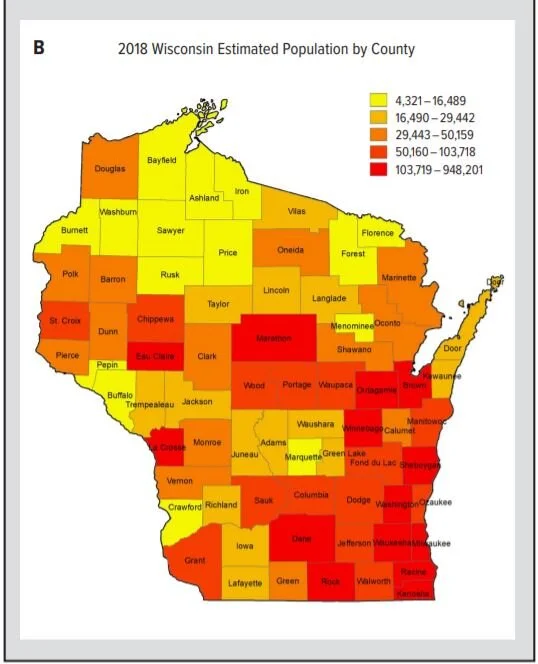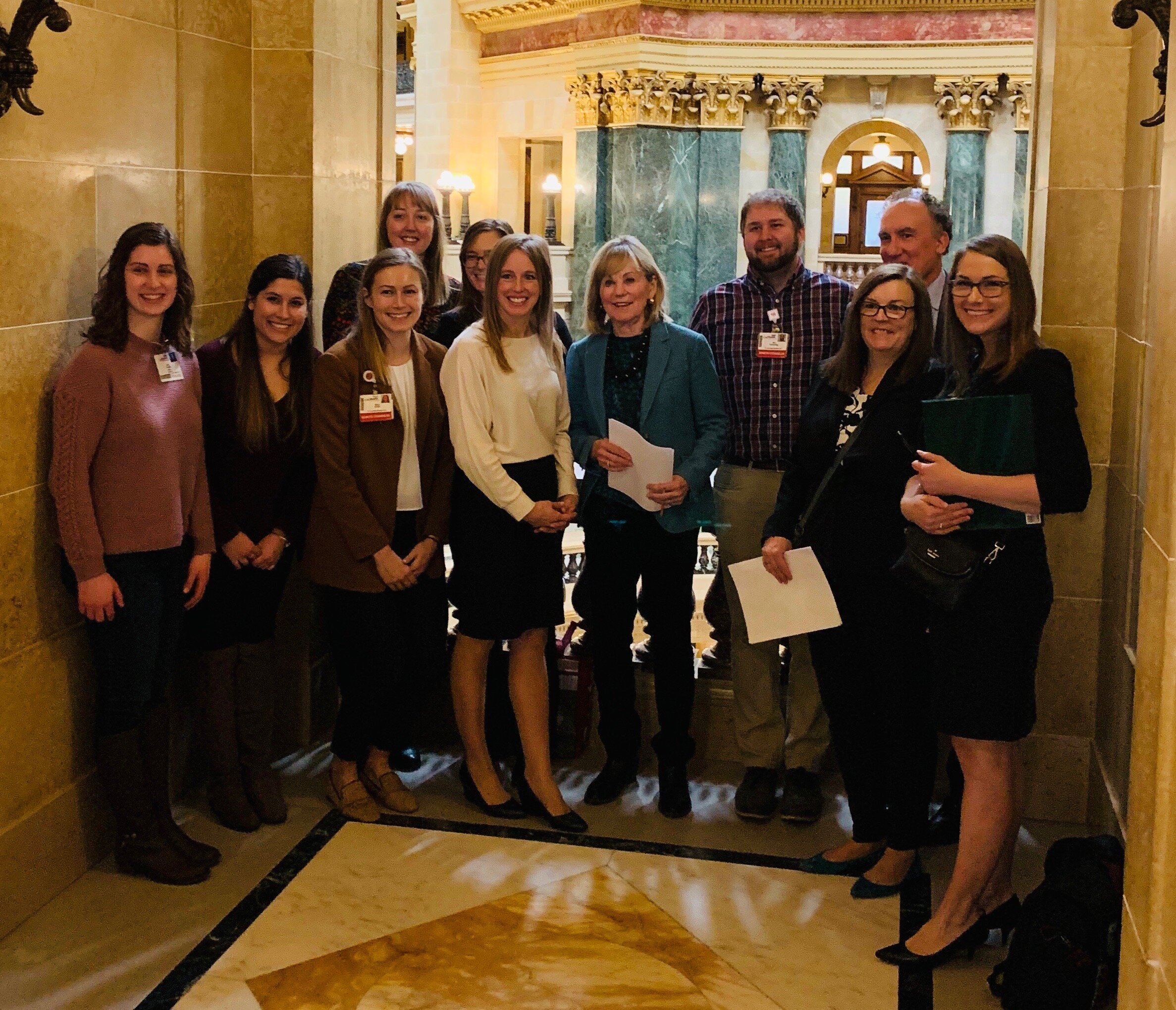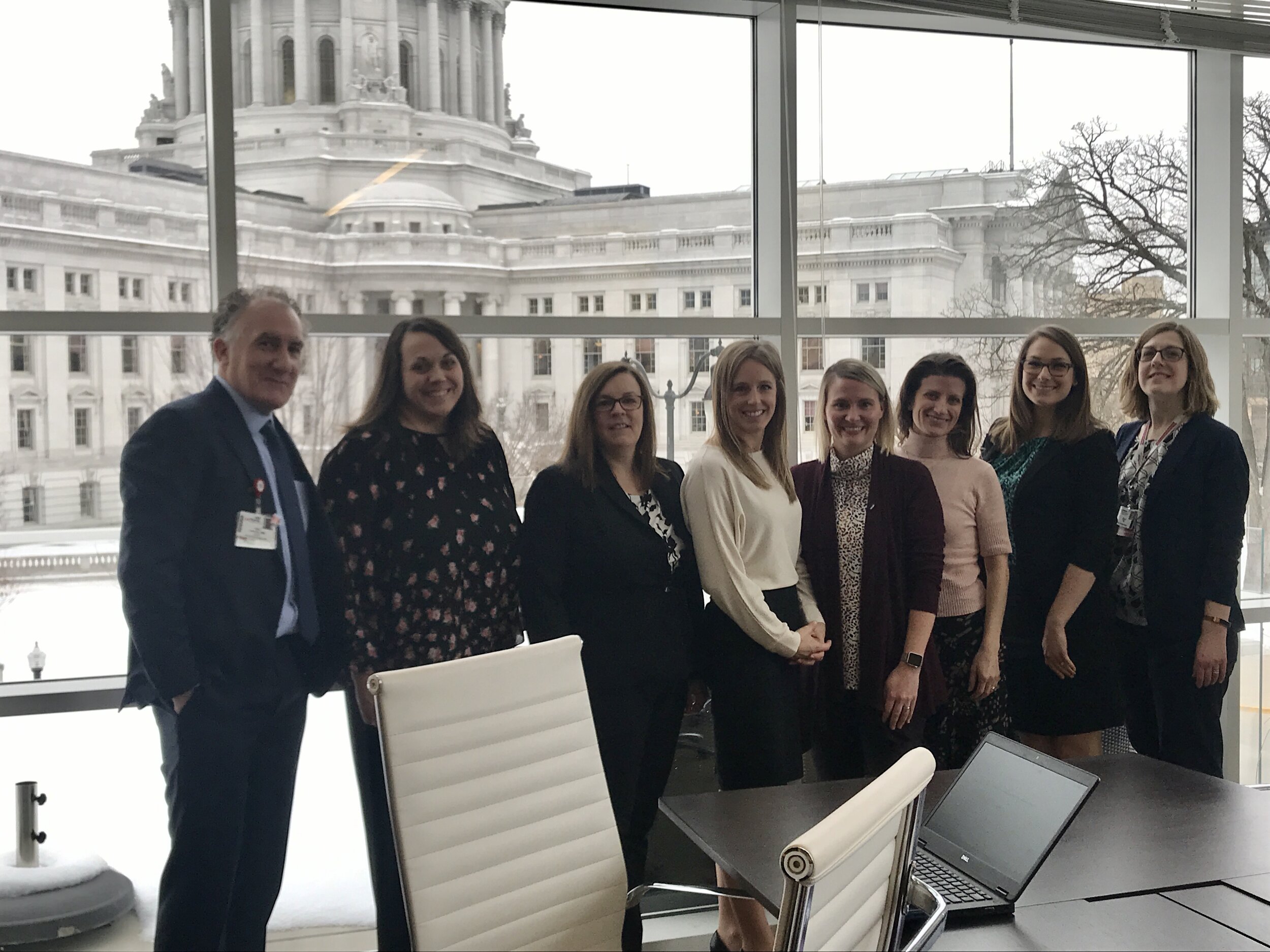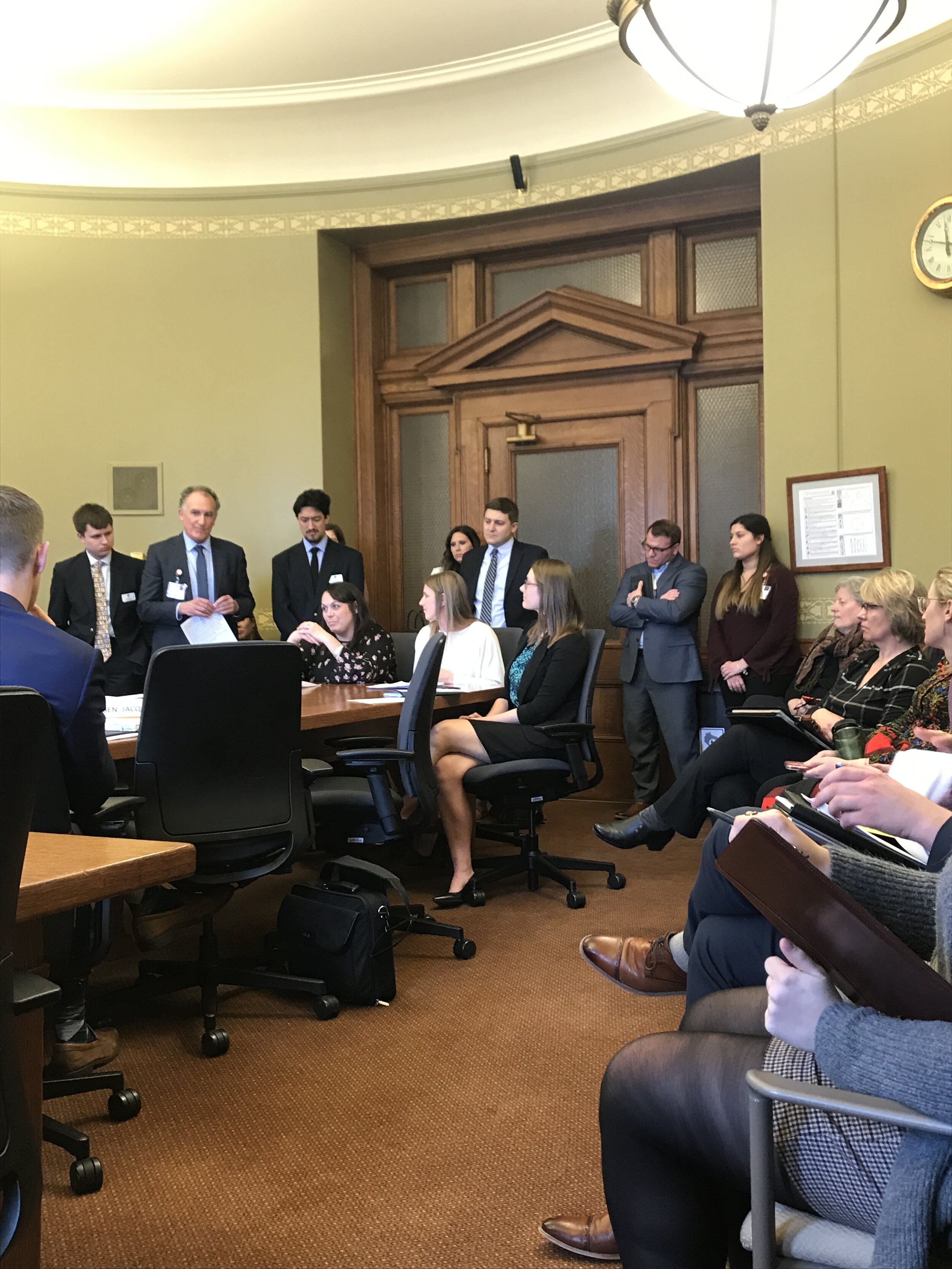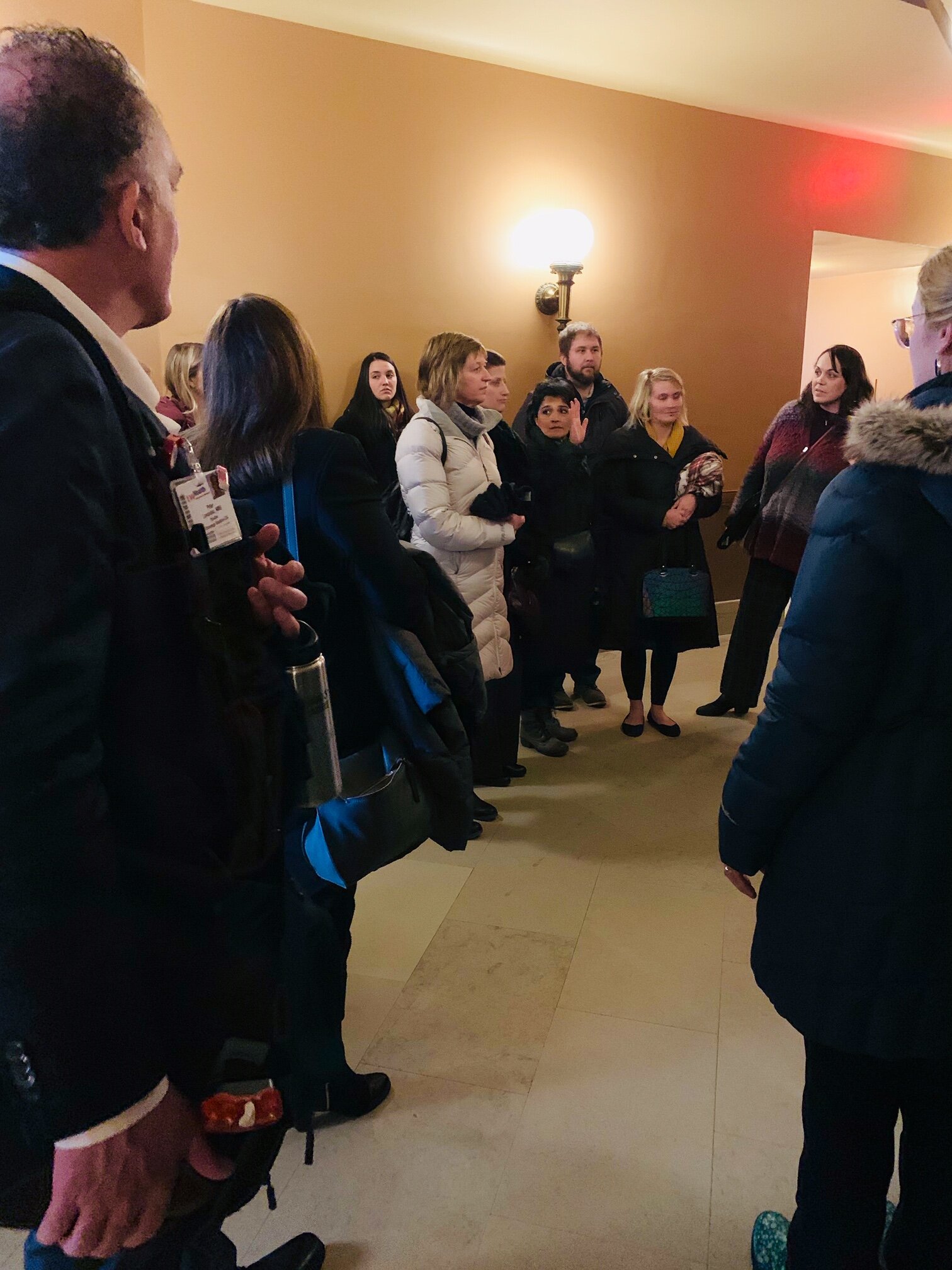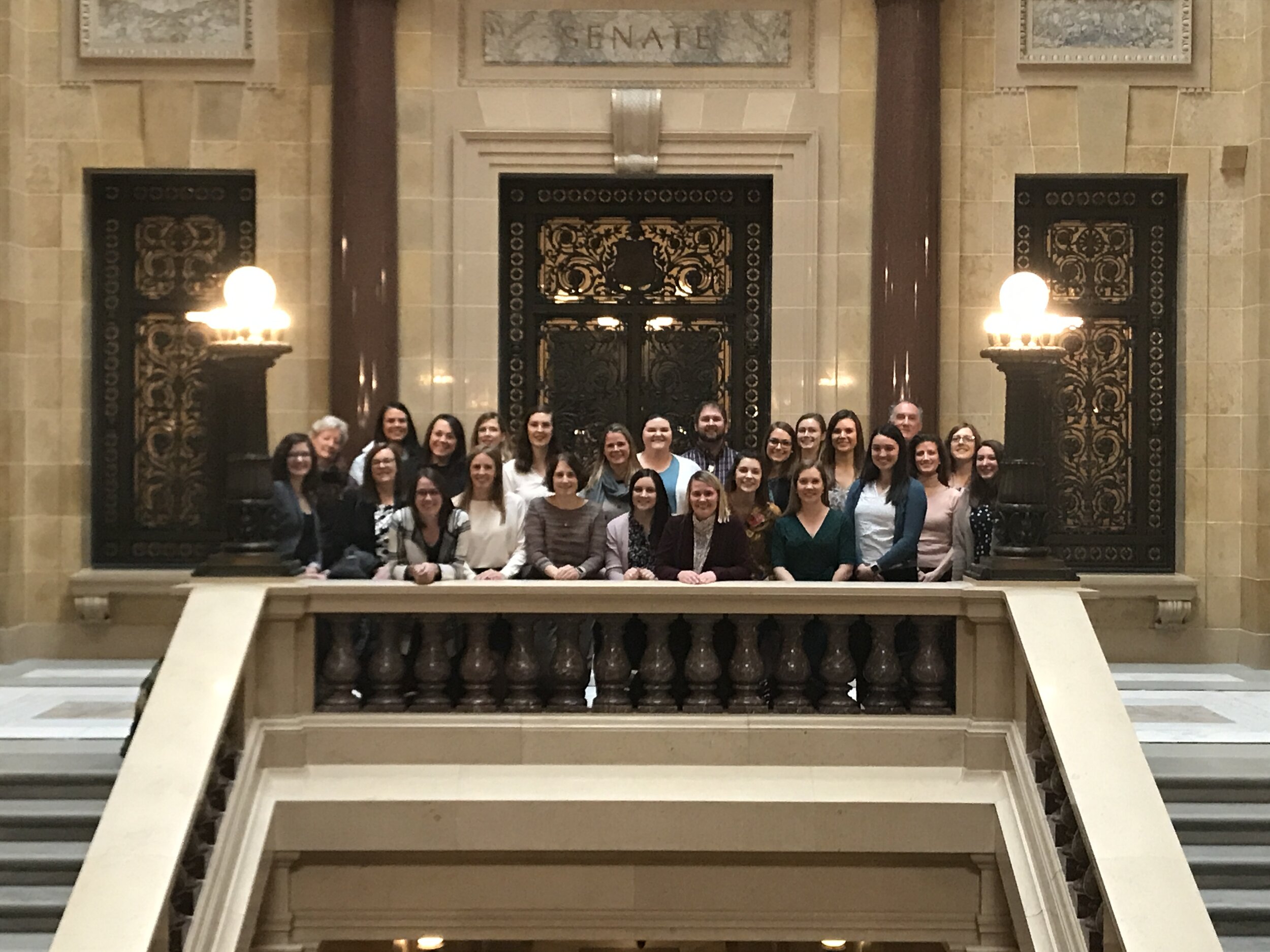Licensure in Wisconsin
Wisconsin is one of the few remaining states which has not passed legislation in recognition of Genetic Counselors as expert healthcare providers. One of the primary goals of WIGCA is to facilitate the effort to gain licensure in our state so that our medical professionals are appropriately accredited and the residents of Wisconsin are protected.
Support the Genetic Counselor Licensure Bill LRB 2011/1 and LRB 2517/1 !
Released March 15th 2021
Ask your friends, family, and healthcare colleagues to write and fax their legislative officers.
Time to call your own state representatives and state senator and ask them to register their support of SB259!
Find you legislators HERE
WHAT DO I TELL MY LEGISLATORS?
“I want to bring attention to an important issue. The Senate Committee on Insurance, Licensing and Forestry will review item SB259 relating to: the regulation and licensure of genetic counselors. I respectfully request that you register in support of this important bill!”
LRB 2011/1 and LRB 2517/1 would:
Increase access to genetic counselors, which should increase patient access to high quality genetic services.
Align with legislation enacted for other allied-health practitioners.
The bill WOULD NOT PRECLUDE other practitioners from providing genetic counseling if these activities are within their own scopes of practice.
This proposal is supported by the Wisconsin Medical Society and multiple other institutions across WI.
If you would like to co-sponsor this bill contact: Christina in Rep. Steffen’s office (6-5840) or Jim in Sen. Testin’s office (6-3123)
Genetic Counselors in the State of Wisconsin
A recent survey analyzed the distribution of Genetic Counselors in the state of Wisconsin:*
Workforce supply and demand models suggest that there should be 1 fulltime equivalent (FTE) genetic counselor providing direct patient care (in clinics and hospitals) for every 75,000 individuals in the population.
The Census Bureau of Wisconsin reported a population of 5.8 million in 2018. This indicates a need for 77 FTE clinical genetic counselors in the state. However, there were only approximately 55 FTE offering clinical services, and some of these providers were split, also providing with non-direct patient care services. Based on the projected need, Wisconsin has less than 50% (37.18 FTE) of the needed genetic counselors to meet the clinical demand.*
The study ultimately found that the workforce shortage in WI results in long patient wait times and an inequitable distribution of services throughout the state, as well as increased stress in the profession and higher considerations to leave job or switch to non-clinical roles.
*Dawson, Carlee; et al. (2020). Does Supply Equal Demand? The Workforce of Direct Patient Care Genetic Counselors in Wisconsin. WMJ : official publication of the State Medical Society of Wisconsin. 119. 158-164.
Providing Licensure in WI for Genetic Counselors is one way in which more genetic counselors may be encouraged to join the state workforce.
Additionally, cities in Wisconsin have fewer genetic counselors compared to other metropolitan areas across the nation, with Milwaukee ranking third lowest in the top US Metropolitan Statistical Areas in which the majority of genetic counselors work in 2019.
National Society of Genetic Counselors. 2019 Professional status survey: the demographics and methodology report. Accessed September 11, 2018.
LEARN MORE
Current limitations
As the field of medical genetics grows, so too does the need to provide the citizens of Wisconsin with accurate information regarding their genetic conditions, risks, and test results. Currently, no state mechanism exists to ensure that an individual providing genetic counseling to citizens of Wisconsin is qualified to do so. In a climate where direct-to-consumer genetic testing is available and the complexity of genomic tests is increasing, the citizens of Wisconsin need to have access to professionals who have been deemed qualified by the state.
The availability of genetic and genomic testing services is rapidly growing. The National Institutes of Health Genetic Testing Registry lists genetic tests for more than 5,800 different diseases. As the number of tests increase, so too does the complexity of testing. The genetic information obtained from whole exome and genome sequencing, as well as next-generation sequencing panels, can be pivotal in identifying inherited disorders and characterizing the mutations that may lead to the development of cancer, cardiovascular disease, or neurological conditions; however, there also are several benefits and limitations that should be considered before and after testing.
2021 Map of States Issuing Licenses for Genetic Counselors, from: NSGC
WHY GENETIC COUNSELORS?
Genetic counselors are healthcare providers with significant training and expertise in human and medical genetics, patient education, and psychosocial counseling obtained through a two-year Master’s-level program.
Genetic counselors are ideally suited to work with physicians and other healthcare providers to deliver high quality, up-to-date genomics services and to ensure that patients using these services are adequately informed. Genetic counselors are key to appropriately integrating genomics into healthcare by assuring patient understanding and consent, as well as avoiding the significant harm that can occur when genetic risk is not identified or when a patient is not properly counseled before or after a genetic test is performed.
Genetic counselors are employed in a wide range of clinical care, academic, laboratory, research, and biotechnology settings. There are over 100 genetic counselors practicing in Wisconsin, a majority of whom provide direct patient care in specialties such as obstetrics, oncology, pediatrics, neurology, cardiology, and ophthalmology. Genetic counselors also work for genetic testing laboratories and health plans. There are also a number of genetic counselors working on public health genomics programs including newborn screening and chronic disease genomics. As the demand for personalized medicine and the availability of genetic tests grows, so too does genetic counselors’ roles in medical, educational, and public health settings, only furthering the need for statewide recognition of our expertise with licensure.
WHY DOES LICENSURE MATTER?
Genetic testing can save lives through tailored medical care and targeted treatment options, but misusing genetic results can lead to unnecessary and expensive surgeries or therapies, resulting in devastating physical, emotional, and financial harm to patients.
Ordering inappropriate testing can also waste thousands of healthcare dollars.
Studies show:
>30% of non-genetics medical providers misinterpret results of genetic tests.
>$60,000 can be saved by institutions per month by involving a GC in the genetic testing process
>$4 billion can be saved over 10 years by improving payor access to genetic counseling
Without licensure, most genetic counselors in WI cannot be credentialed by their employers or bill for their services. This makes it more difficult for medical centers or practices to hire genetic counselors, or offer integrated services such as telemedicine. Moreover, without licensure, some genetic counselors are required to work under physician supervision for billing purposes. This could be considered ineffectual as genetic counselors often have a higher level of genetics training than most physicians (with the exception of medical geneticists). This also limits the number of patients that genetic counselors can ultimately see because their clinical schedules are dependent on the physicians’ schedules
WHAT CAN LICENSURE ACHIEVE?
Improve access to quality genetic services
Require genetic counselors to remain up-to-date on current practices in the field
Draw more qualified genetic counselors to Wisconsin
Encourage institutions to hire genetic counselors
Allow for more patients to receive genetics services
Protect Wisconsin Residents
Provide a means of reporting unethical behavior of a genetic counselor
Ensure appropriate training and certification of those providing genetic counseling
Protect patients from harm
Decrease liability on healthcare systems/ non-genetics providers
Improve Healthcare Costs
Ensure appropriate, cost-effective genetic testing is ordered
Help payors save healthcare dollars
Allow institutions to bill for genetic counseling services, generating revenue for the healthcare systems and the state
Licensure would be budget-neutral for WI, as the cost of regulation will be offset by the fees collected for obtaining a license.
NOW MORE THAN EVER
The rise of direct-to-consumer genetic tests that are available online or at the local drug store, without the involvement of a healthcare provider, are becoming common place. These tests primarily provide information about common traits and ancestry, and in some cases, limited information about certain genetic health risks. However, these unregulated consumer-grade tests are not a substitute for clinical medical tests and should not be used to make healthcare decisions.
Although the clinical validity of these tests, the inconsistency of results, and the lack of sufficient consent, Wisconsinites are making medical decisions based on their results. Even more dangerously, some companies offer consumer’s their raw genetic data, which can be uploaded to third-party tools for further interpretation. Third-party interpretations however, are based on outdated databanks and insufficient analysis. In fact, research shows that 40% of “clinically significant” findings identified by these interpretation tools are in fact false positives and can inaccurately be used to make drastic healthcare decisions if not further evaluated by a healthcare provider trained in genetics who can interpret this information.
Increased availability and awareness of genetic testing has not only led to increased interest in learning about one’s own genetic risks, but has also led to a rise in scammers. Scammers offered Medicare beneficiaries cheek swabs for genetic testing to obtain their Medicare information for identity theft or fraudulent billing purposes. This large-scale scam led to $2.1 Billion dollars being billed to the U.S. Medicare Program.
As such, improving access to licensed genetic counselors for medical-grade, appropriate testing for Wisconsin consumers is now more important than ever.
2019-2020 Licensure Efforts
Grant funding from NSGC in 2019 was used to retain our attorney and legislative representative.
WICGA Social Policy Committee: Secured chief authorship for the bill and obtained a large bipartisan co-authorship list.
SENATE committee meeting with Health and Human Services occurred on January 29 2020.
ASSEMBLY committee meeting with Regulatory Licensing Reform occurred on February 13 2020.
We cannot say THANK YOU enough to the courageous WI GCs who traveled to Madison and testified as poised ambassadors of this bill and of our profession at both committee meetings!!!
There was no registered opposition to our bill at these committee meetings
American Nutrition Association and the American College of Medical Genetics and Genomics expressing concern and requesting amendments which was declined
The Senate committee was scheduled to vote on our bill on February 26, but an anti-abortion bill amendment was requested the day before, and the vote was effectively stopped.
March2020: Covid19 …
WIGCA Members can find a more detailed timeline here
National Genetic Counseling Legislation
H.R. 2144, the “Access to Genetic Counselor Services Act"
H.R. 2144, the “Access to Genetic Counselor Services Act of 2018" has been introduced in the U.S. House of Representatives. The bill is sponsored by U.S. Rep. Brian Higgins (D-New York) and was developed by working closely with NSGC.
Learn more about how you can support
#IAmAGeneticCounselorThe bill would authorize the U.S. Centers for Medicare and Medicaid Services (CMS) to recognize certified genetic counselors as healthcare providers and would improve Medicare beneficiaries accessibility to genetic counselors. Genetic counselors are not currently recognized by CMS even though Medicare covers genetic counseling as a benefit. Because of this, genetic counselors cannot be reimbursed for providing genetic counseling to Medicare beneficiaries. This bill will improve the quality of genetic services and lower healthcare costs.
If you would like to support improved access to Genetic Counselor services, take a few moments to contact your representative and tell them you support H.R. 2144; The Access to Genetic Counselors Act!


